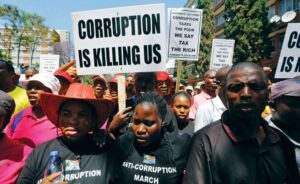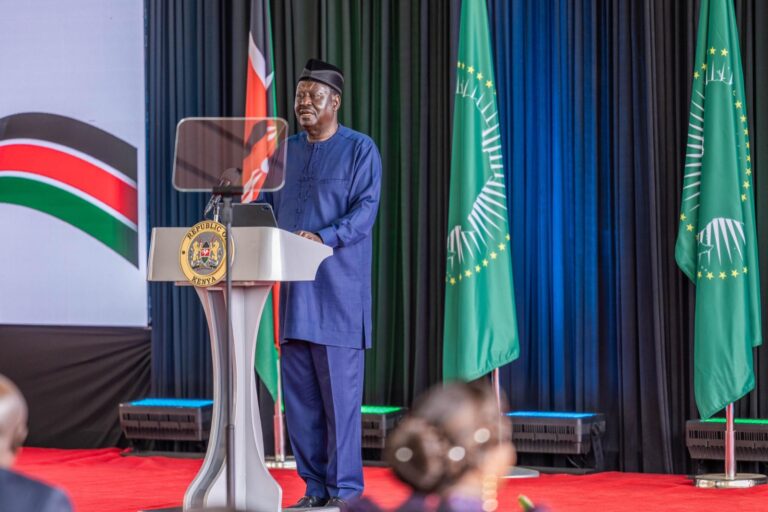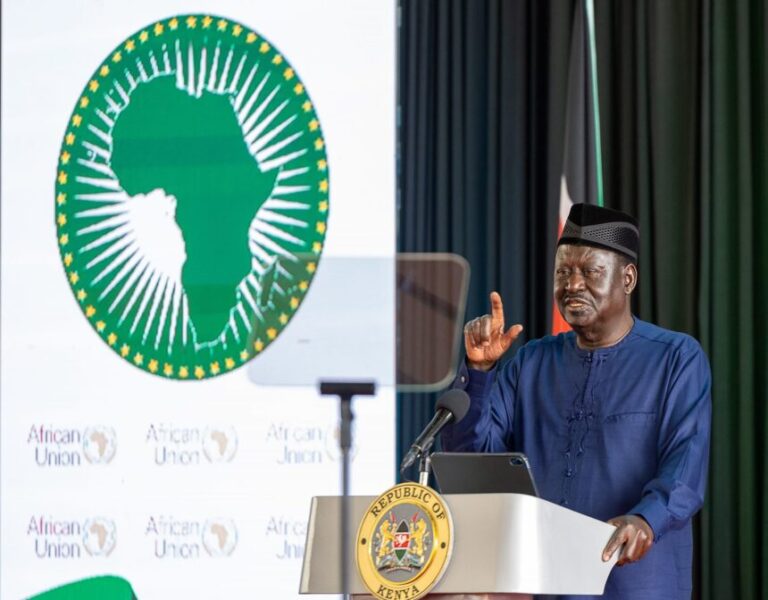The Ethics and Anti-Corruption Commission, headquartered in Kenya’s capital, Nairobi, conducted the National Ethics and Corruption Survey in 2023 to establish the status and perception of corruption in the country. The study consisted of a representative household sample of 5100 respondents aged 18 years and above distributed across all 47 counties. 57.3% of the respondents perceived corruption to be skyrocketing in the country, 47.1% stated that one is likely to encounter corruption and unethical practices in the Ministry of Interior and the coordination of the National government.
Government departments and agencies perceived to be more prone to corruption were: the police at 60.6% followed by the Immigration department and Registrar of Persons. 73.7% of the respondents indicated that they were aware of what constitutes unethical practices, and the most witnessed unethical practices were: bribery at 44%, delay in service provision at 16.2% and abuse of office at 6.6%.
“Public officers, particularly the police, have tolerated a culture of greed which must be curbed or else the country will collapse”, said Fridah Nyakerario, who reiterated that the culture of referring people to job opportunities without proper qualifications is the gateway to corruption, which is witnessed in Kenya and Africa at large.
According to Transparency International’s corruption perception index, as of 2024, Kenya had a score of 32 out of 100, with a change of 1 since last year, which ranks it at position 121 out of 180 countries. 67% thought that corruption had increased in the previous 12 months, while 45% public service users paid a bribe in the previous 12 months. The Corruption Perception Index (CPI) ranges from 0 – 100, where 100 is very clean while 0 is highly corrupt.
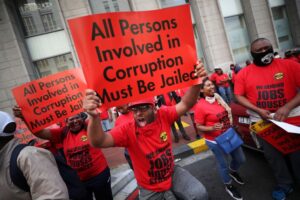
The top African nations that have made tremendous progress in tightening loose ends that stimulate corruption are: Seychelles with the Corruption Perception Index (CPI) score of 72 out of 100, Cape Verde (CPI 62), Botswana (CPI 57) and Rwanda (CPI 57). The low performers are: Equatorial Guinea (CPI 13), Eritrea (CPI 13), Somalia (CPI 9) and South Sudan (CPI 8).
Cote d’Ivoire (CPI 45), Seychelles (CPI 72) and Tanzania (CPI 41) are among the countries that have improved in the war against corruption due to a stronger justice system that they have enforced since 2012. In Tanzania, for instance, corrupt officials have faced consequences for their actions, as those suspected of corruption have been relieved of their duties with the law enforcement launching investigations. Further, a specialized court committed to pursuing corruption and economic crime has been established, confirms Transparency International.
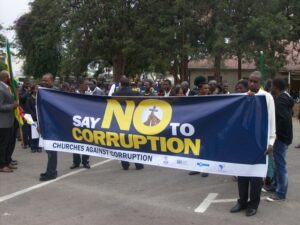
Regrettably, Lesotho (CPI 37), where journalists and civil societies have been silenced, has declined in the fight against corruption. Eswatini (CPI 27) and Gabon (CPI 27) have equally dropped in the CPI index.
“As long as Africa is not united in the fight against corruption and wastage of public resources by government officers continues, Africans, we are doomed. It is high time we speak with one voice as Africa and evict from the office corrupt leaders whose interests do not serve the people,” said Joanne Mong’are, a Kenyan who lives in Komarock estate, Nairobi, Kenya. Joanne further maintained that corrupt people, whether government officials or the general populace.
In Kenya, the Office of the Director of Public Prosecutions (ODPP) and the Ethics and Anti-Corruption Commission (EACC) have been at loggerheads over the acquittal of corrupt officials whose cases have been in the corridors of justice. In 2025, EACC approved the prosecution of three sitting governors and two former governors over corruption allegations. EACC also initiated an investigation into 12 members of parliament over allegations of embezzlement from the County Development Fund (CDF).
The three accused governors have been put to task to answer for a scandalous tender of Kshs 1.42 billion, 142 million and 748 million. Both former and sitting public officials, mainly governors, have been accused of theft and misappropriation of public funds, conflict of interest, money laundering, possession of unexplained wealth and awarding tenders to family members and close associates.
“We have submitted 89 high-profile cases to the ODPP, with four of these cases involving former and current governors”, stated Abdi Mohamud, CEO of EACC, on August 22, 2025.
“We are at an advanced stage of investigating 5 sitting governors and 11 former governors”, reiterated Abdi
Amidst the fight against corruption, President William Ruto’s love for the task force has been met with criticism following his proposal to commission a team to look into the alleged deplorable rot in the parliament.
“The function of that forum is not to take over the roles of anybody”, said Abdi as he addressed the critics who questioned the constitutionality of the task force that was formed by President Ruto to look into corruption cases alleged against parliamentarians.
“We should vote in leaders who have good morals, who respect the public resources and who work for the people. Task force will not help because after all, that task force is taking over the duties of EACC,” said Caleb Odhiambo, who reiterated that instead of the Task force, which he said would dig into public coffers, it was necessary to empower the constitutionally formed organ, the EACC, to enhance its fight against corruption.
As Transparency International records in its 2024 report on Corruption Perception Index that only 32 countries have significantly reduced their corruption levels since 2012; a whopping number of 142 countries have stagnated or gotten worse over the same period, which begs the question, what is corruption, and how can it be eliminated?
What is corruption?
CORRUPTION, an act of dishonesty aimed at personal gain, commonly of monetary value, is a menace that developing economies have long grappled with. From bribery, extortion, fraud, embezzlement, nepotism, to graft, Kenya’s and Africa’s development potential has been held hostage as a consequence of the above manifestations of corruption.
Among other countries, Kenya was grey-listed by the Financial Action Task Force (FATF) for lacking strict policies and measures to fight money laundering and terrorist financing. In the FATF’s grey list, African countries dominated. Policies, laws and regulations to prevent financial crimes and illegal activities have not been strengthened in Kenya.
How do you expect corruption to end when individuals like Senators, Governors, Members of Parliament, and MCAs have registered companies and they award themselves government tenders at their preferred quotes? How can corruption end when Kenyans and Africans are always aiding this bad practice by giving what is asked of them by service providers? We all must change for corruption to end”, said Vidah Akinyi, a resident of Umoja Estate in Nairobi.
In Public offices, conflicts of interest have been a hindrance in the fight against corruption. Public officials use legitimate businesses to launder funds, resulting in tax evasion. Cases of overstatement of reported revenues to justify illegally acquired money are another grey area. Kickbacks for acting as an enabler of financial crime are equally common in public offices. All these manifestations of corruption are carried out by individuals, often the ones in power.
Theoretical Perspective of Corruption
The big question is this: why do society’s powerful engage in corruption? Is it because they are in an advantaged position, or are they inherently deviant?
With power comes resources, influence and the privilege to make decisions and further act on the sole decisions made. In Marxist theory, the bourgeoisie and proletariat represent opposing social classes within a capitalist society. The bourgeoisie, which is the capitalist class, owns the means of production and profits from the labour of others (the proletariat). On the other hand, the proletariat or the working class owns only the labour which they sell for wages to the bourgeoisie, who own companies, make decisions and control the economy.
Power gives the bourgeoisie (the political class) control over what others (the proletariat) want, and with that kicks in the temptation to act corruptly.
To contextualize this, in the Fraud Triangle Theory of crime, individuals are likely to commit fraud in the presence of three elements, namely: opportunity, pressure and rationalization. For example, a county governor may have a personal development project that needs immediate funding (Pressure), and since he/she (the governor) has access to the county development account (Opportunity), he/she (the governor takes the money and justifies the embezzlement by saying to himself/herself that the money will be returned to the respective account (Rationalization).
In the long run, the funds shall have been embezzled to fund an unintended project. Whether the money is returned or not, the act itself will remain criminal. Unfortunately, such funds are never returned to their respective accounts, and that is how corruption is propagated. The painful truth is that such cases of financial embezzlement are common in public offices, and the recovery process often bears no fruit. Kenya and Africa are losing billions under such circumstances.
“If you ask me, I have always had trust issues with government officials. They drive big cars, dress nicely, live lavishly, a life that even their salaries cannot afford. Sadly, they steal from our taxes”, said Jared, a student at JKUAT.
Not everyone is corrupted by power, as some are grounded in principles of good governance. However, certain conditions can exacerbate the vice.
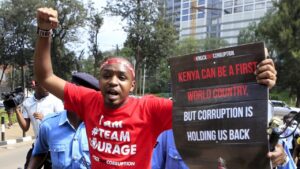
Weak internal control – With weak internal control, accountability in the face of shady dealings is undermined. Strong systems to keep people in power in check are necessary so that they do not yield to money-related crimes. An automated technological system should be preferred over a human watch due to the high likelihood of juniors being enticed by higher-ups or even compromised.
Social inequality – Corruption is a tool of control for the powerful class. A huge gap between the rich and the powerful leaves the poor at the mercy of the rich. The rich use their influence to steal public funds, protect the stolen funds and keep the poor at bay. With poverty comes desperation. Politicians and the rich offer incentives to the poor and desperate class to continually dance to their (the rich’s) tune. Monetary tokens from the political class often act as tools of silencing the citizenry against standing for what is right and speaking to power.
Greed and cultural acceptance – greed pushes the ruling class to continually hoard wealth, thereby leaving the proletariat with little or nothing to live on. Power gives the ruling class access to privileges and opportunities that, without strong ethics, can plunge the nation into economic turmoil. Lack of stringent measures to deal with corruption has made the vice be treated as a norm. People bribe their way to seeking government services, and the ones who fail to cooperate are not served. This way, the entire citizenry is forced to conform to bribery to hasten the service, and the new generation grows up indoctrinated to such practices.
Ultimately, corruption hurts ordinary citizens. The borrowed public debts end up in individual accounts, and the populace is forced to repay these debts and other odious debts with extra hefty penalties when loans are defaulted. The annual budgets are increased exponentially to facilitate the repayment of debts that, sadly, are squandered by the ruling class. With huge budgets comes the economic strain, which directly and indirectly affects the healthcare system, infrastructure, schools and the criminal justice system.
The fact that Ethiopia internally raised $5billion to construct the Grand Ethiopian Renaissance Dam (GERD) is a motivation that Africa can fund its projects without going for international loans, which often end up in the pockets of a few, thereby leaving the citizens incurring the cost of repayment through high taxation.
To uproot corruption, the perpetrators must be punished in a way that maximizes pain. This is a deterrence mechanism to those contemplating theft of public resources and will further suppress the recidivism rate. And it must not end at that; strong institutions should be built, transparency upheld, and the culture of honesty among the populace inculcated. The present systemic rot promotes corruption by providing loopholes for stealing.
